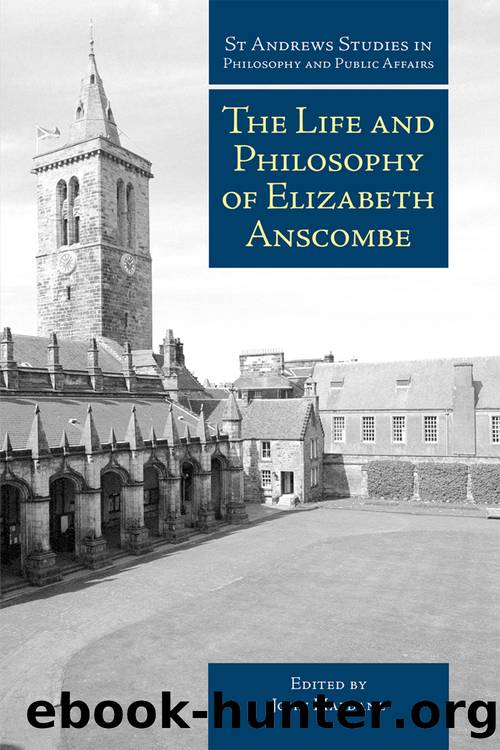The Life and Philosophy of Elizabeth Anscombe by Haldane John;

Author:Haldane, John;
Language: eng
Format: epub
Tags: Philosophy, Anscombe, philosophy of mind, metaphysics, biography, Wittgenstein, human immateriality, spirituality, Geach, soul, abortion, human action, intentionality, intention, double effect, truth, Aristotle, Anselm, thinking, thought, Wiggins, philosophy of language
ISBN: 5836832
Publisher: Imprint Academic
Published: 2019-06-13T00:00:00+00:00
3. Anscombe on the Public Stage
Intention was published in 1957. Between 1956 and 1958 Anscombe was engaged in a series of public arguments with her colleagues, her university and her compatriots. During these three years, Anscombe came to recognize that the Hebrew-Christian ethic, the moral worldview of her Catholic religion, was utterly at odds with both the âhighest and best ideals of the country at largeâ and with the moral philosophy of her contemporaries.[35] She saw the rejection of the older ethic as deeply corrupting, and as responsible for creating âan actually murderous worldâ.[36] Her Christian ethical outlook, she found, was âhateful to the spirit of the ageâ,[37] not because of its normative content, but because it held that there are some kinds of action for which âit is correct to say âOne doesnât have to consider whether to do this or not, in any circumstances; it is simply excludedââ.[38] Anscombe was drawn into bitter public rows because she felt moved to defend that âhatefulâ truth. Her defence, however, is not of interest only to Christians. Anscombe, we will see, looks to provide a conceptual framework within which a secular, as well as theistic, ethics of prohibition could be articulated.[39]
It is against this deeply ethical - and for Anscombe, religious - context that we must see Intention. In short, an ethics according to which some actions are excluded simply in virtue of their kind requires a criterion for the nature and quality of an act. Anscombe, through these rows, came to recognize that such a criterion was lacking Her intention in Intention is to rectify this lack.
In this section we look at that historical context, and at those public debates in which Anscombe participated between 1956 and 1958. In them we witness Anscombeâs gradually coming to the view that âit is not profitable for us to do moral philosophy until we have an adequate philosophy of psychologyâ.[40] In the next section I will return to the intended consequences of Intention.
On 1st May 1956, Oxford Universityâs Convocation - the Universityâs governing body, comprised of all its academics - considered nominations for honorary degrees, to be awarded the following month. One of the nominations was Harry S. Truman, former President of the United States, and the man who had given the order to drop atomic bombs on Hiroshima and Nagasaki. Anscombe, then a tutor at Somerville College, âcaused a small stirâ in the House by arguing that the nomination should be rejected on the grounds that Truman was guilty of mass murder.[41] As such, she said, to show him honours was sycophantic and no different in principle from showing them to Nero or Genghis Khan.
Anscombeâs speech did not persuade - though there is reason to suspect that this was less a matter of her argument than of the fact that members had already made up their minds and were not prepared to change them.[42] The House was asked to indicate its attitude towards the nomination, and showed overwhelming support.[43] On 20th June, Truman was awarded his honorary degree.
Download
This site does not store any files on its server. We only index and link to content provided by other sites. Please contact the content providers to delete copyright contents if any and email us, we'll remove relevant links or contents immediately.
The remains of the day by Kazuo Ishiguro(8395)
Tools of Titans by Timothy Ferriss(7814)
Giovanni's Room by James Baldwin(6810)
The Black Swan by Nassim Nicholas Taleb(6770)
Inner Engineering: A Yogi's Guide to Joy by Sadhguru(6441)
The Way of Zen by Alan W. Watts(6289)
Asking the Right Questions: A Guide to Critical Thinking by M. Neil Browne & Stuart M. Keeley(5357)
The Power of Now: A Guide to Spiritual Enlightenment by Eckhart Tolle(5333)
The Six Wives Of Henry VIII (WOMEN IN HISTORY) by Fraser Antonia(5237)
Astrophysics for People in a Hurry by Neil DeGrasse Tyson(5002)
12 Rules for Life by Jordan B. Peterson(4161)
Housekeeping by Marilynne Robinson(4064)
The Ethical Slut by Janet W. Hardy(4040)
Skin in the Game by Nassim Nicholas Taleb(3968)
Double Down (Diary of a Wimpy Kid Book 11) by Jeff Kinney(3927)
Ikigai by Héctor García & Francesc Miralles(3894)
The Art of Happiness by The Dalai Lama(3847)
Skin in the Game: Hidden Asymmetries in Daily Life by Nassim Nicholas Taleb(3724)
Walking by Henry David Thoreau(3681)
